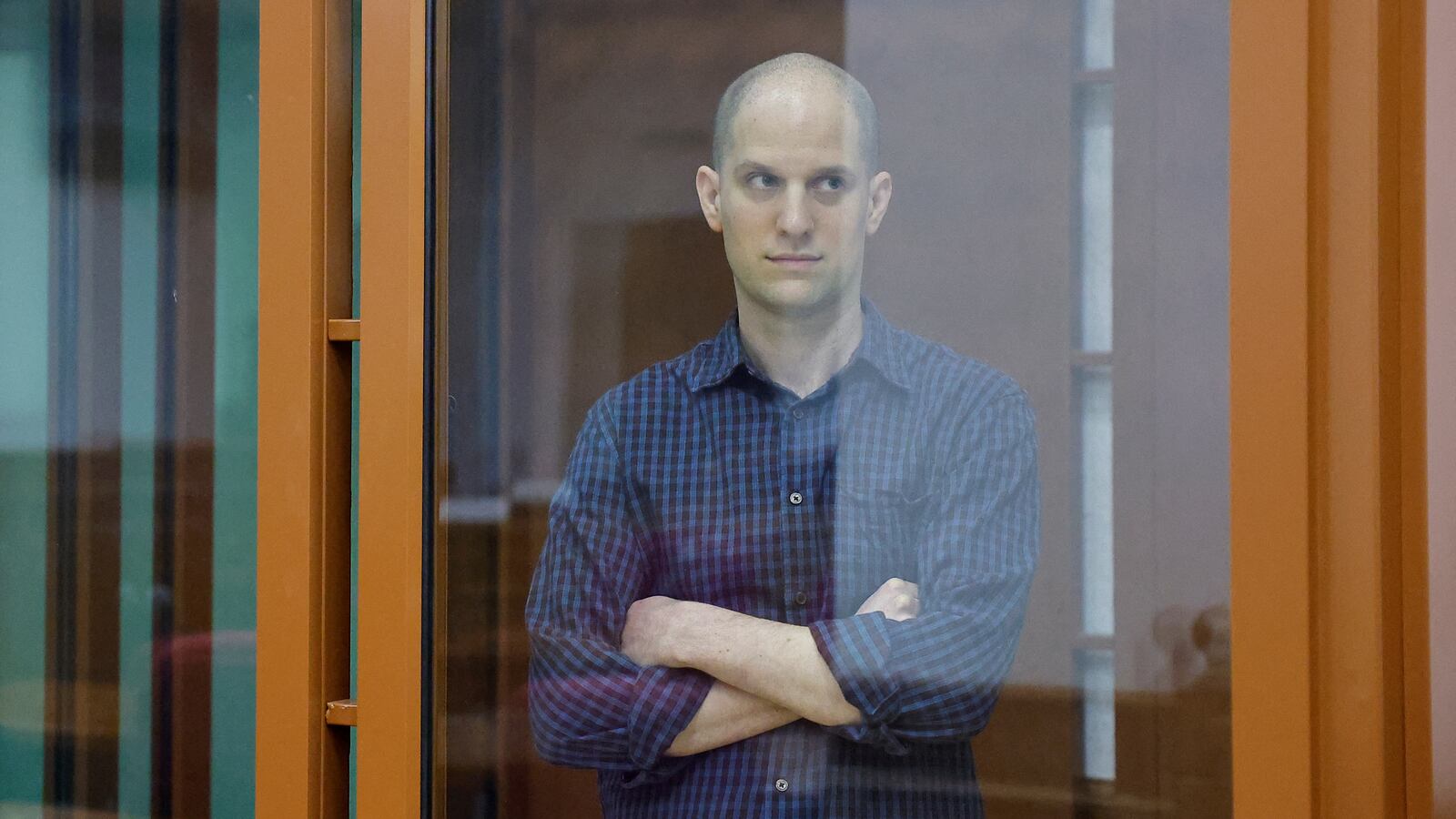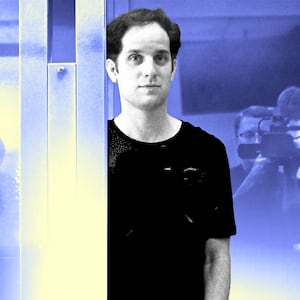Russia’s trial against Wall Street Journal reporter Evan Gershkovich kicked off in a Yekaterinburg court Wednesday with proceedings closed to the press as prosecutors told their tall tale of a nefarious CIA plot carried out by the 32-year-old journalist and heroically thwarted by Russian security services.
More telling than the main show trial underway in the courtroom, however, was the bizarre sideshow that unfolded in the hallway directly outside.
One of the few Western correspondents remaining in the country, the BBC’s Steve Rosenberg, was badgered by a reporter for a local Kremlin-controlled news outlet.
Why? Apparently because Moscow’s propaganda machine wanted to use Gershkovich’s trial to attack the Western reporters telling his story. While holding up his phone to record the interaction, a reporter for KRIK-TV “invited” Rosenberg to Sevastopol—in Ukraine’s Crimea, occupied by Russia—to “cover the situation” there by visiting wounded Russian troops in a local hospital.
“I don’t know why you’re talking to me,” Rosenberg told him in Russian, clearly baffled by the “invitation.”
But the harassment continued even as Rosenberg began to make a phone call, telling whoever was on the other end of the line that he was “in the courthouse, surrounded by Russian media.”
A crowd of other reporters for Kremlin-run outlets stood by filming and watching the entire scene, and the KRIK-TV reporter quickly shifted his attention to Stuart Wilson, the consul general for the U.S. Embassy in Moscow who was also in attendance at Gershkovich’s trial. The KRIK-TV reporter repeated his “invitation” to Sevastopol and stressed that “transportation” to the occupied peninsula had already been arranged, but Wilson made clear he understood this strange offer to visit Crimea was not simply a confused overture from an overly ambitious local reporter: “We can’t accept anything from the host government,” he said.
Russian media later bizarrely accused Rosenberg of engaging in “cancel culture” by “avoiding” dialogue with Kremlin reporters as he was covering the trial.
Inside the courtroom, Gershkovich, now sporting a shaved head, smiled briefly as reporters were allowed to photograph him inside his detention cage. The court instructed reporters not to ask Gershkovich any questions, supposedly at his own request, according to local outlet It’s My City. The U.S. Embassy said diplomats were given “brief access” to the courtroom before proceedings began.
Prosecutors claim Gershkovich acted at the CIA’s behest in gathering “secret information” about Russian military equipment from a defense enterprise, though they have not presented any evidence of that. Gershkovich and his colleagues have maintained that he was only doing his job as a reporter covering Russia’s war against Ukraine.
Eva Hartog, the former chief editor for The Moscow Times who worked closely with Gershkovich before he joined The Wall Street Journal, told The Daily Beast that both the charges against him and the harassment of the BBC reporter covering his trial are part of Russia’s all-out war on independent media, which until relatively recently had mostly targeted Russian journalists and left foreigners unscathed.
All bets are now off as even longtime foreign correspondents find themselves “obstructed” to varying degrees by the hands of the Kremlin.
“It does this in different ways: by retracting accreditations, by jailing Evan and thereby sending a signal to the entire community that there are no red lines anymore and even being an accredited journalist will not protect you. And by making life generally unpleasant for those [correspondents] who, despite the risks, decide to stay, burdening them with paperwork, having them followed and harassed etc,” she said.
In addition to Moscow’s bid to stamp out any media that won’t toe the Kremlin line, she said, Gershkovich’s case is also part of “Russia stockpiling Americans in order to be used as bargaining chips in its own political game.”
Shortly after Gershkovich was arrested last year, Bloomberg reported that the move had been personally approved by Vladimir Putin. Just a few months later, Putin sat down with former Fox News host Tucker Carlson and all but confirmed that Gershkovich was just a pawn: Sure, he said, the WSJ reporter could probably be released, but first the U.S. must “think about how they can contribute to achieving the goals our special services are pursuing.”






